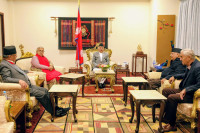Opinion
Sacrificial lambs
The fear of foreigners’ usurping Nepal has made citizenship laws discriminatory against women
Sapana Pradhan Malla
News has surfaced that the four major parties have whittled down the suggestions received on the draft of the constitution to seven major points, which includes citizenship. As the political parties ponder on replacing the ‘and’ clause (which says that if a Nepali wants to obtain Nepali citizenship by descent, they will have to show that their mother ‘and’ father are Nepali) with the ‘either’ clause (which gives a Nepali mother ‘or’ a Nepali father the right to pass citizenship to their children independently, regardless of their spouse’s nationality), it is crucial to remember the principles of equality that should guide the constitution-drafting process.
The main argument for the ‘and’ clause has persistently been the threat to national security, national sovereignty and nationalism. The proponents of the ‘and’ clause accuse its opponents of wanting to distribute citizenship to every foreigner who walks into Nepal. They say that Nepal cannot afford to become liberal when it comes to citizenship. As a result, to rein in foreigners, Article 12.1.b says that even if a Nepali is married to a foreigner, the foreigner spouse has to be Nepali at the time their children apply for citizenship. Children should also be born in Nepal and have their permanent domicile in Nepal.
First of all, while asking for citizenship through a mother’s name, no one is asking that each individual who crosses the border be given Nepali citizenship. We are instead demanding that our children be citizens by descent based on jus sanguine (blood) and our foreigner spouses naturalised citizens based on marriage. If we, women, are also the citizens of this country, we demand the same rights that men enjoy. Infringing upon women’s citizenship rights does not protect national security. If it did, we would not need the security system, would we?
What the supporters of the ‘and’ clause adamantly refuse to acknowledge is that their fear of the foreigners has made Nepali women and their children sacrificial lambs.They forget that the right to citizenship does not and must not start with foreigners, but with the Nepalis who are born to a Nepali parent. The primary concern of the citizenship provisions should be our own citizens, whose right to enjoy being part of Nepal in every aspect—socio-economic and political—we must protect and ensure. The issues of nationalism, national security and national sovereignty are, of course, important, but they are not men’s prerogative.
Still discriminatory in effect
On the face of it, this ‘and’ provision seems gender equal, but only restrictively so.
In all democratic nations, if one of the parents is a citizen of that nation, their children can become one as well. And indirectly, the ‘and’ clause denies the citizen’s right to choose partners in marriage, right to choose domicile, right to family, and right of daughters to child custody.
The proponents of the ‘and’ clause forget that marital bliss is elusive to a lot of Nepali couples. Sometimes the wife runs away, leaving her husband and children behind. Sometimes the husband runs away. Sometimes the father refuses to acknowledge his children as his in fear of the disclosure of his relationship with the mother or in fear of having to give the mother half of his property. Sometimes the wife walks out of an abusive relationship and sometimes the husband simply vanishes. And sometimes the couples separate without any legal formalities.What happens to the children in these circumstances?
The draft assumes that such children will stay with their mothers and, therefore, has a clause (12.4) which says that a person born to a Nepali mother whose father is unknown can become a Nepali by descent as long as their father is not a foreigner. We have all seen how this insert has already been manipulated by bureaucrats to make single Nepali mothers feel worthless and their children stateless, by asking the mothers to prove that their husbands are not foreigners even when they are Nepalis. The ‘and’ provision will once again give these bureaucrats the audacity to call Nepali mothers whores and sluts.
Some leaders mislead us by saying that the ‘and’ provision is actually ‘either’, that the constitution now allows Nepalis to get citizenship in the name of their father or mother. But if we look at articles 12.1.b, 12.2 and 15, we are entitled to get the citizenship certificate in the name of either of the parents only if both the father and mother are Nepalis. The ‘and’ clause remains in effect.
Separate laws, equal citizens
The supporters of the ‘and’ clause see Nepal as a Nepali man’s ‘ghar’ and a Nepali woman’s ‘maiti’—a notion challenged and changed in many countries. Nothing reflects this patriarchal mindset better than the discriminatory provisions on citizenship by naturalisation. The draft says that a Nepali man makes a foreigner woman Nepali by marriage as soon as she starts the process of relinquishing her foreign citizenship. A foreigner man married to a Nepali woman, on the other hand, has to wait for 15 years before he can even apply.
Some lawmakers say that if these provisions are to be gender equal, all Nepalis married to foreigners must be willing to wait for seven years before their spouses can be Nepali. If the lawmakers cannot accept this seven-year clause, that gives them no right to ask foreigner husbands of Nepali women to wait for 15 years. This is not in the spirit of equality; daughters, daughters-in-law, sons and sons-in-law should all be treated equally.
Inequality keeps being perpetuated in another sub-clause on citizenship by naturalisation. The children of Nepalis married to foreigners can become naturalised citizens only if they are born in Nepal. How can a person born to a Nepali person not become Nepali by descent and then be barred from running for office one day? Every day thousands of Nepalis leave for work and study abroad. We have no right to tell them whom to marry,where to give birth to their children and to force their spouses to relinquish their national identity because their children cannot become Nepali one day and serve their nation as its leader. How can the lawmakers first adopt the framework that does not recognise citizenship under jus soli (birth), and then demand jus soli for those children born to Nepalis with foreigner spouses? That is a double standard.
The bogey border
The supporters of the ‘and’ clause seem to be worried by the open border we share with India, by the cross-border marriages that take place between people in the Tarai in Nepal and Bihar and Uttar Pradesh in India. They say they are worried that every child born to a Madhesi woman and an Indian man will become a Nepali and flood Nepal. But if the open border really is a problem, we need to regulate it, while still keeping it open.
None of us wants foreign interference in our domestic issues, but the real threat rises if we start to play the dangerous, divisive politics of discrimination against our own, when we systematically exclude a certain group or community—such as Madhesi women—from access to resources and power.
The lawmakers must understand that nationality is a legal bond between a person and a state, and is not dependent on a person’s ethnic origin or gender. A constitution needs to ensure freedom from fear, not be infused with fear. It should not be guided by geo-political conditions or by the principles of the Rana regime, when there were two kinds of laws for two kinds of people—‘high’ and ‘low’. Everyone has the right to nationality and the right against statelessness. No one can be arbitrarily deprived of his or her nationality and neither marriage nor the dissolution of a marriage should affect the nationality of the other spouse.
Nepal cannot be independent if its women are dependent on men, if lawmakers, born of women, cringe at the thought of preserving a mother’s identity. How can anyone ask a woman—who gives birth—about the father and not ask men—who cannot give birth—about the children’s mother? None of us fell from the sky. We all are born of women and born equal.
Pradhan Malla is a senior advocate and former member of Constituent Assembly




 10.12°C Kathmandu
10.12°C Kathmandu











